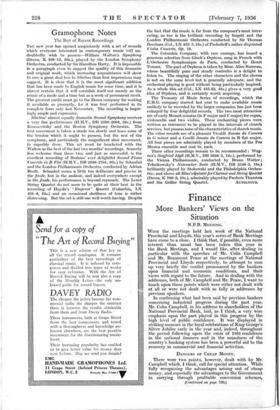Gramophone Notes
The Best of Recent Recordings THE new year has opened auspiciously with a set of records which everyone interested in contemporary music will un- doubtedly wish to possess—William Walton's Symphony (Decca, X 108-18, 30s.), played by the London Symphony Orchestra, conducted by Sir Hamilton Harty. It is impossible in a paragraph even to suggest the quality of this dramatic and original work, which• increasing acquaintance will show to owe a great deal less to Sibelius than first impressions may suggest. It is clear that it is the most significant addition that has been made to English music for some time, and it is almost certain that it will establish itself not merely as the music of a mode and a time but as a work of permanent merit. The greatest credit must go to the Decca company for making it available so promptly, for it was first performed in its complete form only last November. The recording is inspir- ingly ample and expressive.
Sibelius' almost equally dramatic Second Symphony receives a very fine performance (H.M.V., DB 2599-2604, 36s.) from Koussevitzky and the Boston Symphony Orchestra. The first movement is taken a shade too slowly and loses some of the tension which it ought to possess, but the rest of the symphony, and particularly the magnificent slow movement, in superbly done. This set must be bracketed with the Walton as the best of the last two months' recordings. Scarcely less welcome than these two, and just as successful, is the excellent recording of Brahms' ever delightful Second Piano Concerto in B Flat (H.M.V., DB 2696-2701, 86s.) by Sclmabel and the London Philharmonic Orchestra, conducted by Adrian Boult. Schnabel seems a little too deliberate and precise in the finale, but in the andante, and indeed everywhere except in the finale, his performance is beyond reproach. The Lener String Quartet do not seem to be quite at their best in the recording of Haydn's Emperor ' Quartet (Columbia, LX 451-4, 24s.) and an occasional shrillness of tone is rather distressing. But the set is still one well worth having. Despite the fact that the music is far from the composer's most inter- . esting, so too is the brilliant recording by Szigeti and the London Philharmonic Orchestra conducted by Sir ThoMas Beecham (Col., LX 483-5,18s.) of Prokofiefrs rather disjointed Violin Concerto, Op. 19.
The Columbia Company, with rare courage, has issued a generous selection from Gluck's Orpheus, sung in French with L'Orchestre Symphonique de Paris, conducted by Henri Tomasi. The part of Orpheus is taken by Mme. Alice Rameau, whose beautifully pure and steady contralto is a delight to, listen to. The singing of the other characters and the chorus is not on the same level but is generally adequate, and the orchestral playing is good without being particularly inspired: As a whole this set (Col., LX 425-32, 48s.) gives a very good idea of Orpheus, and is certainly worth acquiring.
The Treasury of Music Series of recordings, which the E.M.G. company started last year to make available music unlikely to be recorded by the larger companies, has just been enlarged by four delightful records. The two most attractive are of early Mozart sonatas (in F major and C major) for organ, violoncello and two violins. These enchanting pieces were written as intermezzi to be played in the intervals of church services, but possess none of the characteristics of church music. The other records are of a pleasant Vivaldi Sonata da Camera in G minor and a Corelli Sonata da Camera in B flat major. All four pieces are admirably played by members of the Pro Musics ensemble and cost 6s. each.
Three other recordings remain to be recommended : Wag- ner's Siegfried Idyll (H.M.V., DB 2634-5, 12s.), performed by the Vienna Philharmonic, conducted by Bruno Walter ; Tchaikowsky's Nutcracker Suite (H.M.V., DB 2540-2, 18s.) brilliantly played by Stokowski and the Philadelphia Orches- tra; and above all Bliss's Quintet for Clarinet and String Quartet (Decca, K 780-8, 10s.), admirably played by Frederic Thurston and the Griller String Quartet. AUTOLYCUS.














































 Previous page
Previous page